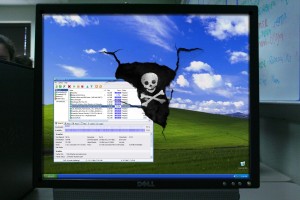
By Wren Culp
Staff Writer
Taking cars, iPods and cell phones is what people call stealing. Physical stealing is illegal. But what most people don’t think about is the fact that stealing something over the Internet is also stealing. It’s called piracy. And it’s illegal.
Since the dawn of the Internet in 1989, music artists had a new way of reaching audiences, companies had better ways to get their products out, and online shopping even emerged. The internet was a revolution.
But of course, there are always people that want to take a shortcut when it comes to paying for stuff. The textbook definition of stealing is “to take the property of others without permission or right”. And in the case of pirating, you’re not stealing physical property, your stealing something that someone designed or created.
“It doesn’t shock me,” CHS technology manager Lynn Hardin said. “It’s sad that people don’t have better morals and have to resort to stealing.”
Pirating software and other items dates back to even before 1980, where anyone could freely copy computer programs and pirate without any legal restrictions whatsoever. The U.S. Patent Office recognized copyrights on the computer software, but only the source code. Despite the clear illegality of pirating software, illegal software accounts for roughly half of all the software in use, according to the Business Software Alliance.
Before the Internet however, thieves used dial –up bulletin board systems to upload and distribute software to local computer owners. Thieves could get on a telephone connection and download the files to their computer, or meet other people who pirate and trade floppy disks that contained the material.
Law enforcement was rendered useless to the “software bandits”. Then the Internet came into play. Anyone in the world could download any software for free if they wished. Authorities were in hot water now.
Then, along came 1990. And a new concept was introduced. It’s called Peer to Peer sharing, or more commonly known as P2P. Peer to Peer networks, specifically BitTorrent clients and Napster, allowed users to share files with millions of people around the world, and leave no trace that it ever took place.
“I’ve downloaded a lot illegally,” said an anonymous source. “I’m not proud of it but sometimes I don’t have the money to pay for things that I want or need.”
For a while after that point things tended to slow down a little bit. But then the major punch to the gut came. In the late 1990s, personal computer sales jumped tremendously. It all started when Microsoft released Windows 95 which required few literary skills from the user, thus making stealing software easier.
People have been caught in the past pirating software. One of the more famous cases is when Microsoft filed a law suit against Chris Fazendin for posting a “crack”, a way to make programs run without authentication, for Microsoft Office 97 on his web site. Microsoft won and forced Fazendin to repay the $345 standard cost of the program for each time someone downloaded the crack from his web site. When he could not pay anymore, he was forced to surrender his computer and promise never to do it again.
Software is not the only thing being downloaded illegally though. Ever since the DVD revolution took place, DVD’s have been popular to “rip” at their computers. Ripping means taking a copy of the movie and putting on your computer, and is becoming a very popular thing to do.
The maximum penalty for getting caught pirating anything is going to prison to up to 10 years and/or a fine of $250,000. In April of 2009, the founders of the popular torrent hub called the “Pirate Bay, were sentenced to a year in jail with fines of roughly $3 million to be dispersed among entertainment companies like Warner Bros. and Sony.
With Internet pirating growing as fast as the Internet is, at some point pirating may not be traceable at all.














